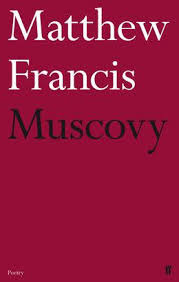Review of Muscovy, by Matthew Francis, pub. Faber

Like his previous collections, this one contains much journeying and much fascination with the way words work when arranged in patterns. It also reminds me of an earlier collection, Dragons, in that you can see the influence of Welsh topography and history becoming stronger in it. Above all it is notable, like all his work, for two characteristics that are not found together all that often, but that work together very well: accurate observation and creative speculation. He is very good, in other words, at both pinpointing in words exactly what he sees and imagining what he has never seen. The first quality brings a mountain to life in "Walker": sheep on its steep slopes
canted to one side,
trotting on their adjustable legs
till my upright seemed askew
and its wetness:
my feet pressed
a black oil from the spongy surface.
The hollows bristled with reeds.
One might drown there, high above the earth
- true, and quite disconcerting when one comes to think about it. The other side of him is at work in "The Man in the Moon", based on Francis Godwin's 17th-century prose fantasy of lunar exploration (the work Cyrano de Bergerac parodied). When the poem's protagonist invents goose-powered flight and tests it out with a lamb aboard, we not only see the lamb:
I tied him to the frame. The geese flapped.
the rag-doll face showed nothing.
A bleat blew away,
and for the space of two fields
he treadled the air
but also feel his own later ascent beyond weather and gravity and see earth from a new angle, the "pear with a bite out of one side" that is Africa. The same curiosity about the different enables him, in "Familiar Spirit", to inhabit the ghost that is now uncomfortable with thoughts of the humanity from which it has loosed itself:
that sugar-mouse flesh I had once,
and its hangers-on of arms and legs,
hair, toenails, parents, siblings
The title sequence, "Muscovy", chronicles another journey that must have felt fantastic in its day, the embassy to Moscow on which Andrew Marvell served in 1663-4. Again it is the observational and imaginative detail that brings it alive: the cold that "finds you in your sleep", the sauna where you bake "till your hair hurts". Its unnamed narrator (not Marvell) is by turns bemused and amused, and the humour which has always featured in Francis's poetry also surfaces in the word-games of this collection, like "Enigma Variations", an alphabet whose every verse analyses a letter by omitting it, and "Poem in Sea", whose lines each consist of three words or part-words beginning with s, e and a. Somewhat on the same plan is "Was", a poem less about the past and memory than about the way these ideas are constructed, the way smells, tastes, habits become iconic for an era:
Cabbage was cooked everywhere at once.
Curry was pacified in its circle of rice.
Wine was a sweet gold opened at Christmas.
The TV was afloat on a sea of fuzz.
It was switched on early to let it breathe.
The end of it was a diminishing star.
It's possible that those who never watched TV in the 50s and early 60s will miss just how accurate and evocative this is, which would be a pity. But this poet's curiosity, keen eye and verbal exuberance should entertain and absorb most readers.
Published on October 13, 2013 04:51
No comments have been added yet.



